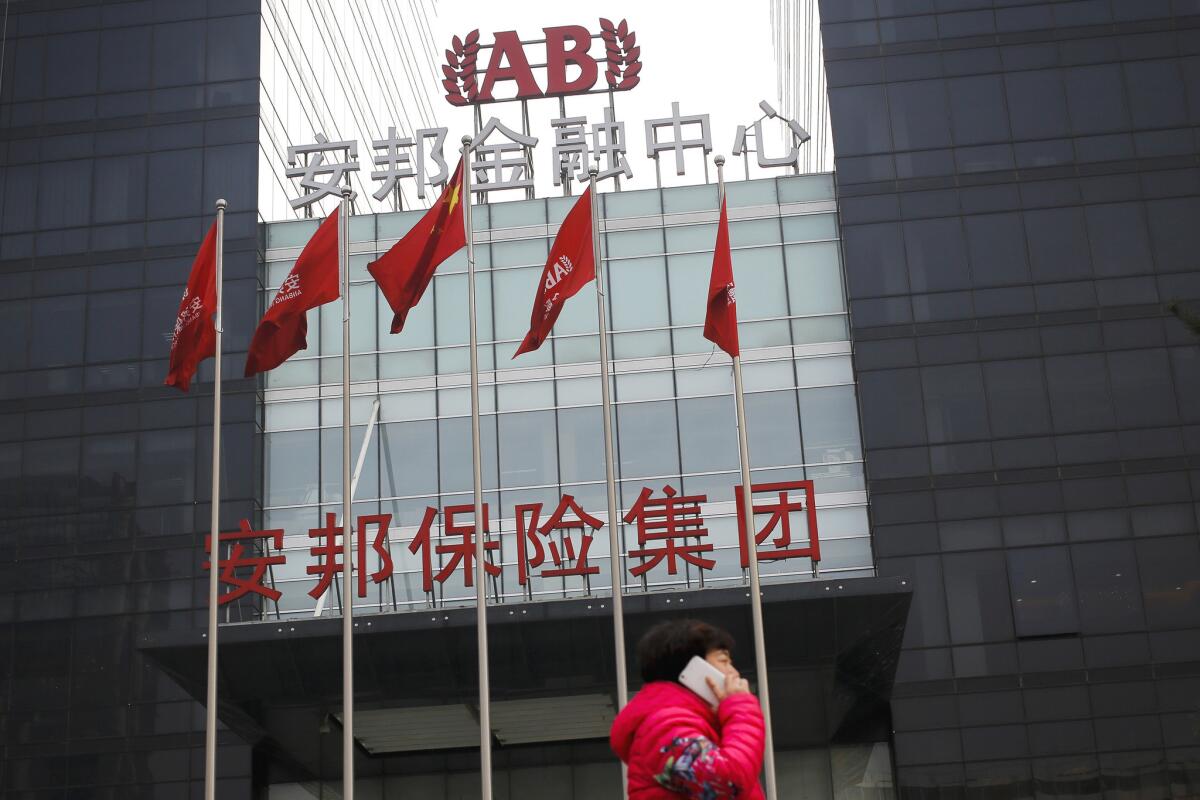Starwood Hotels jumps at Anbang’s sweetened bid; Marriott could counteroffer

Investors led by Anbang Insurance Group have upped their bid for Starwood Hotels & Resorts. Above, Anbang’s building in Beijing.
- Share via
Starwood Hotels & Resorts Worldwide Inc. called off a $12.2-billion buyout agreement with Marriott International Inc. in favor of an offer from a group of investors led by Chinese insurance company Anbang Insurance Group Co.
The decision came after Anbang upped its offer for Starwood by nearly $370 million Friday, bringing the total to more than $14 billion.
Starwood, which owns the Sheraton and Westin hotel brands, has to pay Marriott $400 million to end the deal.
The latest offer from Anbang and its partners is worth $83.67 for each share of Starwood, up from its previous offer of $81.50 per share. Starwood shareholders would get $78 in cash for each share they own plus $5.67 in stock for a spinoff of a vacation business.
Marriott has until March 28 to make another offer. The Bethesda, Md., company said Friday that it still believes its agreement with Starwood is superior and is contemplating its next step. Marriott first offered to buy Starwood in November, which would have created the world’s largest hotel company, with more than 1 million rooms.
The million-rooms mark has long been seen as the “holy grail” for hotel companies and was a major factor in the Starwood-Marriott deal, said Christopher Muller, professor of the practice of hospitality at Boston University’s School of Hospitality Administration.
“Worldwide, it puts them in a position where they have enough rooms, and they don’t have to be reliant on those third-party price setters,” he said, referring to sites such as Expedia and Trivago. “It gives them market clout they don’t currently have.”
Plus, the larger network of hotels would enable the combined company to better compete with the reach of home-sharing site Airbnb.
Although Starwood loses the million-rooms advantage if it goes with the Anbang bid, the Stamford, Conn.-based hotel company could benefit from Anbang’s large presence in China, Muller said. Starwood recently made a push to expand in Asia and cater to the region’s growing middle class.
And the sweetened offer from Anbang made it difficult to turn down.
“I think the board has a responsibility to at least consider this offer because it’s so much of a jump,” Muller said. “You’re talking big money.”
Anbang seems to have plenty of cash, said Bill Crow, managing director for financial services firm Raymond James.
“There does not seem to be any constraint of capital with Anbang,” he said. “If we’ve learned anything from their negotiations from the Waldorf Astoria, it’s that they’re very long-term-natured investors, and that’s not the worst environment to be in when you have a very cyclical industry, like lodging.”
If the deal falls through, it doesn’t necessarily mean that Marriott will seek another acquisition. Starwood was unique in that it was putting itself up for sale. Marriott had said that one of the key assets Starwood brought to the deal was its much-loved loyalty program, Starwood Preferred Guest.
Shortly before noon Pacific time, shares of Starwood were up $3.82, or 5%, to $80.21. Shares of Marriott rose $1.56, or 2.2%, to $73.36.
Anbang made a dramatic entry into the U.S. two years ago when it bought the famed Waldorf Astoria hotel in New York for almost $2 billion. Days before it contested Marriott for control of Starwood, it agreed to a $6.5-billion deal to buy Strategic Hotels & Resorts Inc., which owns several high-end properties, including the JW Marriott Essex House in New York and Hotel Del Coronado in San Diego.
Times staff writer Samantha Masunaga contributed to this report.
More to Read
Inside the business of entertainment
The Wide Shot brings you news, analysis and insights on everything from streaming wars to production — and what it all means for the future.
You may occasionally receive promotional content from the Los Angeles Times.










